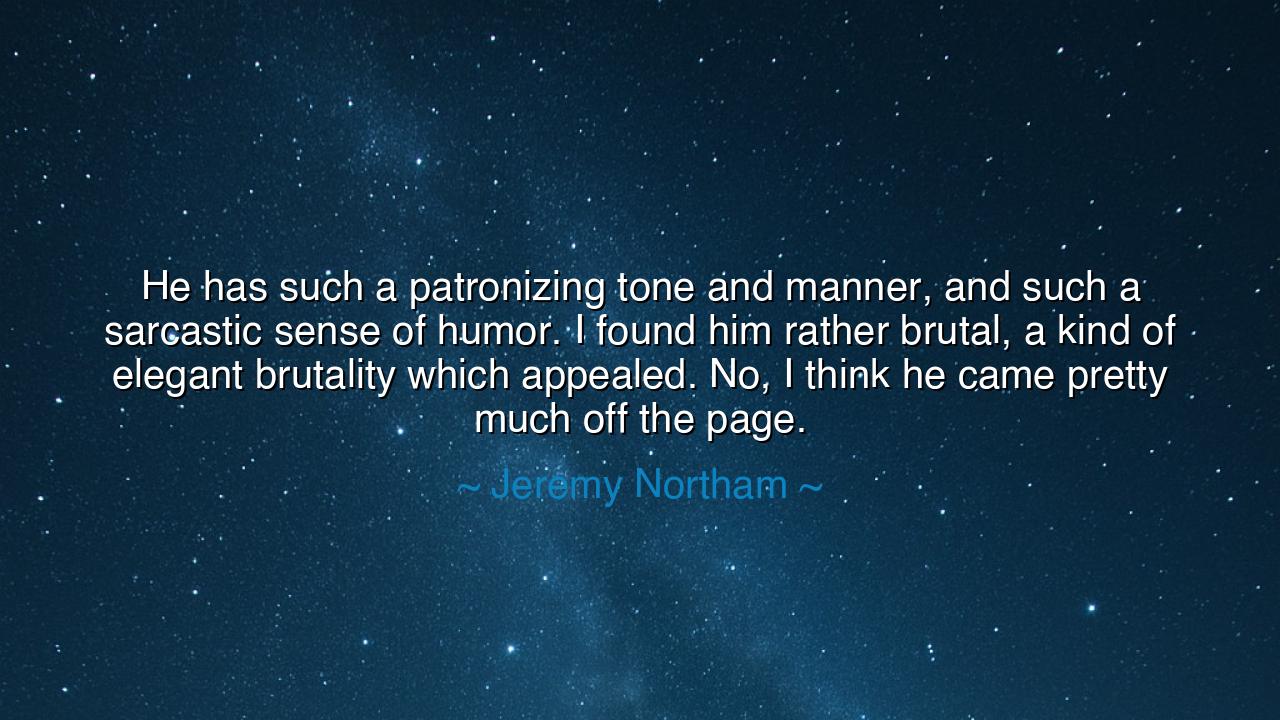
He has such a patronizing tone and manner, and such a sarcastic
He has such a patronizing tone and manner, and such a sarcastic sense of humor. I found him rather brutal, a kind of elegant brutality which appealed. No, I think he came pretty much off the page.






In the words of Jeremy Northam, spoken with the reflective poise of a craftsman of character: “He has such a patronizing tone and manner, and such a sarcastic sense of humor. I found him rather brutal, a kind of elegant brutality which appealed. No, I think he came pretty much off the page.” Here lies not merely an actor’s comment on a role, but a mirror to human nature itself — the strange fascination with elegant brutality, the irresistible magnetism of wit sharpened like a blade. Northam’s insight reveals a truth the ancients knew well: that beneath refinement and civility, there often beats a heart of power, and that the tension between grace and ruthlessness can both repel and enthrall.
This patronizing tone and sarcastic humor are not the crude weapons of cruelty, but the polished instruments of the intellect. They wound without blood, they command without force. Such qualities, when wielded with mastery, captivate as much as they unsettle. The ancients would have called this logos wrapped in iron — speech honed to both charm and conquer. To find this brutality appealing, as Northam confesses, is to recognize in it a form of truth — that confidence, clarity, and dominance, when blended with grace, awaken something primal within us: awe for the power of composure under fire.
Think of Marcus Aurelius, the philosopher-emperor. His manner was never coarse, his words never loud, yet his calm authority silenced armies and senators alike. He understood that elegance in strength commands deeper respect than raw aggression. Even when rebuking his generals or confronting betrayal, his discipline was unyielding but his tone serene — an elegant brutality born not of malice, but of mastery over self. So too did Northam’s character — born from the page — embody that same paradox: a man refined, yet formidable; cultured, yet capable of cruelty when provoked.
This brutality, when tempered by elegance, becomes an art form — a reflection of power without chaos, of control without mercy. It fascinates because it speaks to the dual nature of humanity. We are drawn to strength, yet we crave beauty; we admire gentleness, yet we revere command. To combine both — to strike like lightning and yet shine like dawn — is to approach the ideal the ancients called arete, excellence of soul. That is what Northam glimpsed and named: not mere arrogance, but a kind of terrible grace.
Yet we must tread carefully, for there lies danger in admiration. To imitate the sarcastic humor or the patronizing tone without the wisdom behind them is to become tyrannical rather than powerful, cruel rather than commanding. The ancients taught that virtue lies not in domination, but in the mastery of one’s own passions. To practice elegant strength, one must cultivate stillness within — to know when to speak and when to withhold, when to wield sharpness and when to soothe. For words, like swords, must be sheathed in purpose, not pride.
The origin of Northam’s quote lies in his portrayal of complex characters — men drawn from literature whose flaws made them deeply human. “He came pretty much off the page,” he said, recognizing that the brilliance and brutality of such a man are not inventions, but reflections of us all. We are each, at times, the elegant and the cruel, the patient and the sarcastic, the noble and the flawed. In understanding such figures, we confront the duality within ourselves — and in that confrontation lies growth.
The lesson, then, is this: seek not to be gentle in all things, nor harsh in all things, but to be precise — to let your manner carry strength wrapped in civility. Cultivate the art of elegant control — to express truth with clarity, to assert without cruelty, to lead without vanity. When anger rises, temper it with composure; when confidence swells, dress it in humility. For true mastery, as Northam’s reflection reminds us, is not the loudness of the warrior, but the quiet power of the sovereign who knows his own measure.
Thus, as the ancients would teach, polish your strength as one polishes a sword — that it may shine without needing to strike. In your speech, your humor, your manner, let there be the balance of intellect and compassion, wit and restraint. For elegant brutality, rightly understood, is not savagery — it is the art of truth spoken without fear, of dignity held without apology. Learn this balance, and you will walk as the wise have always walked: calm in bearing, sharp in mind, and luminous in spirit.






AAdministratorAdministrator
Welcome, honored guests. Please leave a comment, we will respond soon